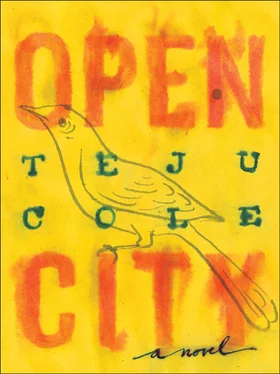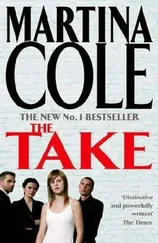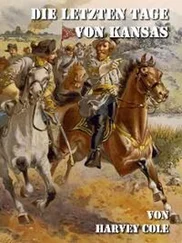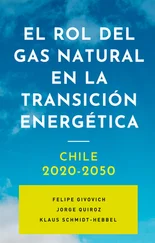That night, he packed his soccer shoes, two spare shirts, and all his money, around six hundred Liberian dollars. At the bottom of his tattered backpack, he placed his mother’s birth certificate. The rest of the things in the suitcase he emptied into a ditch. The suitcase itself he threw into the bush. He did not, himself, have a birth certificate, which was why he took his mother’s. He escaped the farm, walking the road alone in the darkness, all the way back to Monrovia. He couldn’t return home, so he went to the burnt ruin of his school, near the Old Ducor Hotel, and cleared a corner there. He thought that if he went to sleep, maybe he would die. The idea was new to him, and it felt good. It helped him sleep.
I was startled by a sudden knock on the Plexiglas. One of the Wackenhut guards had walked up, behind me, and I had been so absorbed in Saidu’s story that I started, and dropped my hat. The guard said, You fellas have thirty minutes. Saidu looked up at him from the other side of the partition, smiled, and said thank you. Then he lowered his voice again, leaned forward, and spoke even more quickly, as though the words now flowed freely from some hitherto blocked aquifer of his memory.
That night he slept in the breeze from an open window, until a hissing sound woke him up. He opened his eyes, but kept his body still, and in the charred darkness he saw, across the long room, all the way at the other end, a small white snake. He tensed, wondering if the snake had seen him, but it continued to move, as though it were looking for something. Then a gust came through the window, and Saidu saw that the “snake” was actually an open exercise book, its pages fluttering in the wind. The memory of that apparition remained, he said, because he often wondered, then and later, if it meant something for his future. Morning came, and he stayed at the school all that day, hiding, and slept there when night fell. That night again, the book moved in the darkness and kept him company; he stayed half-awake and watched its pages rising and falling, and sometimes he saw it as a snake and sometimes as a book. The following day, he saw some ECOMOG soldiers from Nigeria, who gave him boiled rice. He pretended to be retarded, and he hitched a ride with them, traveling in their armored truck as far as Gbarnga, in the north of the country. Then he went on foot to Guinea, a journey of many days, switching between his sandals and his soccer shoes. Both gave him blisters, but in different places. When he got thirsty, he drank water from puddles. He was hungry, but he tried not to think about it. He couldn’t remember how he walked the ninety miles to the small town in the Guinean hinterland, or how that brought him, on the back of a farmer’s motorcycle, to Bamako.
By now, the idea of getting to America was fixed in his mind. In Bamako, unable to speak Bamana or French, he’d skulked around the motor park, eating scraps at the marketplace, sleeping under the market tables at night, and dreaming sometimes that he was being attacked by hyenas. In one dream, his mate from school came to him, bleeding from his severed hand. In other dreams his mother, aunt, and sister showed up, all of them crowding around the market table, all of them bleeding.
How much time passed? He was unsure. Maybe six months, maybe a little less. He eventually befriended a Malian truck driver, and washed his truck in exchange for food. Then this driver introduced him to another one, a man with light brown eyes, a Mauritanian. The Mauritanian asked him where he wanted to go, and Saidu said America. And the Mauritanian asked him if he was carrying any hashish, and Saidu said, no, he had none. The Mauritanian agreed to take him as far as Tangier. When they left, Saidu wore a new shirt the Malian driver had given him. The truck was packed with Senegalese, Nigeriens, and Malians, and they had all paid, except for him. It was extremely hot during the day, and freezing at night, and the water in the jerry cans was carefully rationed. I wondered, naturally, as Saidu told this story, whether I believed him or not, whether it wasn’t more likely that he had been a soldier. He had, after all, had months to embellish the details, to perfect his claim of being an innocent refugee.
In Tangier, he said, he had noticed the way the black Africans moved around, under constant police surveillance. A large group of them, mostly men, and mostly young, had a camp near the sea, and he joined them. They wrapped themselves in blankets against the cold wind from the sea. One man next to him said he was from Accra, and told Saidu that journeying through Ceuta was safer. When we enter Ceuta, the man said, we have entered Spain, we will go tomorrow. The following day, they went to a small Moroccan town near Ceuta in a van, a group of about fifteen of them, then they went on foot to the border with Ceuta. The fence was brightly lit and the man from Accra led them down to where the fence met the sea. A man was shot last week, he said, but I don’t think we should be fearful, God is with us. There was a boat waiting, operated by a Moroccan ferryman. They held hands in prayer, then loaded up, and the man rowed across the shallows. They completed the ten-minute journey to Ceuta undetected, rolled ashore, and scattered into the rushes. Ceuta, as the Ghanaian had said, was Spain. The new immigrants split up in many directions.
Saidu entered Spain proper after three weeks, through Algeciras, on a ferry, and no papers were required. He found his way across the southern part of the country, begging in town squares, lining up at soup kitchens. Twice he picked pockets in crowded corners, throwing out the ID cards and credit cards, keeping the cash; this, he said, was the only crime he ever committed. He went all the way across southern Spain until he crossed the Portuguese border, and he kept going until he got to Lisbon, which was sad and cold, but also impressive. And it was only after he arrived in Lisbon that the bad dreams stopped. He fell in with Africans there, working first as a butcher’s assistant, and then as a barber.
Those were the longest two years of his life. He slept in a crowded living room with ten other Africans. Three of them were girls, and the men took turns with them and paid them, but he didn’t touch them, because he had saved almost enough for the passport and his ticket. If he waited another month, it would be one hundred euros cheaper, but he couldn’t wait; he had the option of saving money by flying to La Guardia, and he’d asked the ticketing agent if she was sure La Guardia was also in America. She had stared at him, and he shook his head, and bought the JFK ticket anyway, just to be sure. On the passport, which was made for him by a man from Mozambique, he insisted on using his real name, Saidu Caspar Mohammed, but the man had had to invent a birth date, because Saidu didn’t know his real one. The passport, a Cape Verdean one, arrived on a Tuesday; by Friday, he was in the air.
The journey ended at JFK Terminal Four. They took him away at customs. On the table between him and the officer that day, Saidu said, was a plastic bag with his possessions, clothes mostly, and his mother’s birth certificate. The bag had been tagged. Voices rose from the other side of the partition. The officer then looked at him, looked at the notes his colleague had made, shook his head, and began to write. Then two women came in, smelling of bleach. One of them was a black American. They took him up, and put a rubber bracelet across both his wrists. The bracelet cut his skin, and when he stood up, the black American woman pushed him. Was he afraid? He wasn’t afraid, no. He hadn’t thought it would take long to sort it all out. He was thirsty, and after being cooped up in the plane, he longed simply to be outside in the air, and to smell America. He wanted food, and a bath; he wanted a chance to work, perhaps as a barber to start with, then something different. He would go to Florida, maybe, because it was a name he had always liked. They steered him forward, as if they were leading a blind man, and as he crossed the partition and saw into the other room where the rising voices had come from, he saw men in uniform, white men and black men, with guns in their holsters.
Читать дальше












